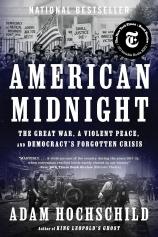American Midnight: The Great War, a Violent Peace, and Democracy's Forgotten Crisis
Review
American Midnight: The Great War, a Violent Peace, and Democracy's Forgotten Crisis
In AMERICAN MIDNIGHT, distinguished author Adam Hochschild has recreated a period in American history (1917-1921) when mob violence seemed to dictate national policy, and resistance to war or support of minorities could result in imprisonment or death for American citizens willing to speak out.
With Europe in turmoil, America was on edge, led by the strangely diffident President Woodrow Wilson. Jim Crow laws had become the unspoken rule in the South, where the end of slavery had provoked fear and loathing among many white people, with lynching a tacitly accepted practice (at the rate of a hundred or more per year) and the rise of the Ku Klux Klan a simple (to some, welcome) result. In the northern states, unrest came from the wish of workers for better conditions. The Industrial Workers of the World (aka the Wobblies) were threatening and sometimes carrying out strikes.
"Hochschild deftly weaves the skeins of the many distressing historical facts he has mined, creating a portrait of the US that may awaken many to the need for reexamination of basic values."
Hochschild’s dark tale begins with the arrest in Tulsa, Oklahoma, of 11 men lounging in the IWW headquarters. These individuals, who had committed no crime (the formal charge was vagrancy), were sentenced to five years in prison when they proved unable to pay their fines, and six Wobblies in the courtroom were arrested immediately after the trial. Resisting America’s involvement in the war would occasion even more arrests, with figures like anarchist Emma Goldman, socialist Kate Richards O’Hare and union proponent Eugene V. Debs imprisoned for exercising their right to free speech.
Immigration became a hotbed issue, with government policymakers systematically barring European Jews and other undesirables from making the transition to freedom, sometimes imprisoning them at Ellis Island for indeterminate periods before deporting them.
The era’s harsh and ever-increasing rules and regulations would incite a young, zealous J. Edgar Hoover to rise in the ranks and hold sway in the FBI for nearly half a century. Wilson, whom Hochschild describes as “the most enigmatic of American presidents,” participated with European allies in drafting the Treaty of Versailles, which would so stringently punish Germany for its actions that another world war was arguably the eventual consequence.
Hochschild deftly weaves the skeins of the many distressing historical facts he has mined, creating a portrait of the US that may awaken many to the need for reexamination of basic values. He holds that “almost all the tensions that roiled the country” during the period described in his diligently researched work “still linger today.” In order to prevent the sort of overt and subtle chaos and catastrophe depicted from arising again, he advises that we educate ourselves, speak out and carefully maintain basic respect for “civil rights and constitutional safeguards.” And, one might wonder, if that period of our American story was its midnight, whence comes the dawn?
Reviewed by Barbara Bamberger Scott on October 7, 2022
American Midnight: The Great War, a Violent Peace, and Democracy's Forgotten Crisis
- Publication Date: October 17, 2023
- Genres: History, Nonfiction
- Paperback: 432 pages
- Publisher: Mariner Books
- ISBN-10: 0063278529
- ISBN-13: 9780063278523




